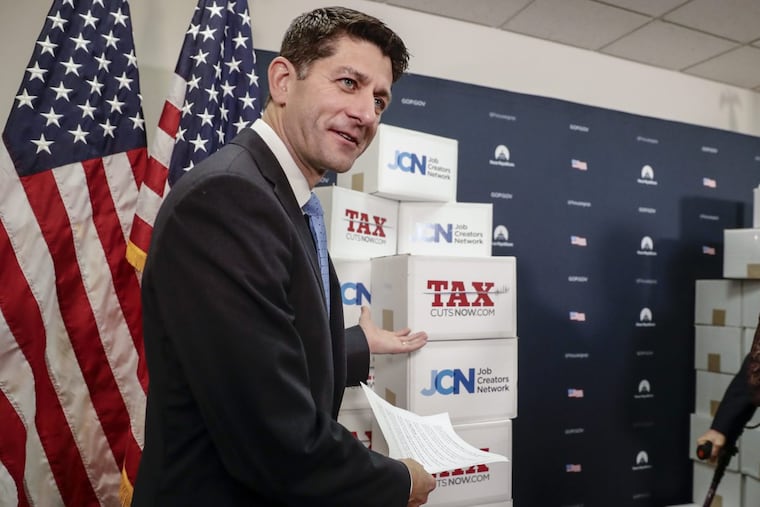Tax proposals: Won't help economy, ease debt, or simplify tax code | Mark Zandi
Boosters of the tax proposals argue that they will significantly increase economic growth. They also argue that this additional growth will generate roughly enough additional tax revenue for the plan to pay for itself. They are wrong on both counts.

The tax cuts the Trump administration and the Republican Congress appear set on rushing into law are a big mistake. They won't help the economy, they'll add significantly to the nation's debt, they won't make the tax code simpler, they'll be a boon to big corporations and very wealthy households, and they couldn't be more poorly timed.
So what's not to like?
Boosters argue that economic growth will significantly increase. The most common refrain is the tax cuts will lift real GDP growth closer to 3 percent per year, from the roughly 2 percent that has prevailed during the current expansion. They argue this additional growth will generate roughly enough additional tax revenue for the plan to pay for itself.
They are wrong on both counts. The tax cuts will not meaningfully improve economic growth, at least not on a sustained basis. Growth would be stronger initially, since borrowing money to give to taxpayers will temporarily juice up their spending. But with unemployment already very low near 4 percent, and headed lower even without tax cuts, the Federal Reserve will have no choice but to raise interest rates more quickly. Long-term interest rates will also increase due to the Fed's actions and investor expectations of larger future budget deficits.
Any economic benefit of the lower tax rates will be washed out by the higher interest rates, and the economy will end up no bigger than it would have been.
The tax cuts will significantly exacerbate the nation's fiscal problems. While the lower marginal tax rates do have economic benefits on revenues, they are not sufficient to pay for the cuts. Government borrowing thus increases, causing interest payments on the accumulating debt to rise. The added interest payments offset the economic benefits on revenues. The tax cuts will thus add $1.5 trillion to the nation's deficits over the next decade, increasing the government's debt-to-GDP ratio from just over 75 percent today to almost 100 percent a decade from now.
Instead of making the tax code simpler and easier to game by enterprising accountants and lawyers, the proposals add to its complexity, particularly for small businesses that declare business profits as individual incomes. With corporate tax rates coming down, these businesses have a big incentive to become C corporations. Congress knows this, and twists the proposed tax code to reduce these incentives; even then, whether this will work is unclear.
Businesses get big tax cuts. Of the $1.5 trillion price tag, more than $1 trillion goes to businesses, mostly large multinational corporations. Individuals get the rest, but most of those tax cuts would go to the nation's wealthiest households, which won't have to pay nearly as much in tax on their big estates. Lower- and lower-middle-income taxpayers ultimately enjoy little to no tax cut.
It's particularly bad timing for deficit-financed tax cuts. This is evident when considering the economic and fiscal backdrop during the last tax cuts — the Reagan cuts of the early 1980s and the Bush tax cuts of 2001. Those cuts were bigger than what the House and Senate currently plan, but they became law when the economy was struggling and the fiscal situation substantially better than today.
The early 1980s was a time of serious economic stress, with double-digit unemployment and the bursting of the stock market bubble. In 2001, the Sept. 11 attacks pushed the economy into recession. By contrast, unemployment today is very low and set to soon become among the lowest in U.S. history. Most businesses already complain they can't find qualified workers to fill their record number of open jobs. Inflation is still low, but Fed policymakers believe it is set to accelerate even without a push from a deficit-financed tax cut.
It's a toss-up where the current debate over tax policy will land. Views on the tax cuts' prospects have been all over the place. For the moment, investors appear to believe odds are about even the administration and Congress get something done. It's hard to see big deficit-financed tax cuts getting through the Republican Congress, but there are powerful political incentives to pass something, including the fast-approaching 2018 midterm elections.
The economic outlook depends in good measure on what happens, or does not happen, in Washington in the next few weeks. If tax-overhaul efforts fail, it will be an opportunity lost, but it will be better than passing large deficit-financed tax cuts as proposed.
Good tax reform is very difficult to do. The tax proposals that policymakers are currently considering do not get it done.
Mark Zandi is chief economist at Moody's Analytics. help@economy.com